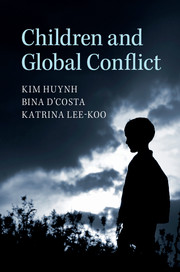Book contents
- Frontmatter
- Dedication
- Contents
- List of abbreviations
- Introduction: why children matter to global conflict
- 1 Children and armed conflict: mapping the terrain
- 2 Children and agency: caretakers, free-rangers and everyday life
- 3 Children and IR: creating spaces for children
- 4 The rights of the child: political history, practices and protection
- 5 Child soldiers: causes, solutions and cultures
- 6 Child forced migrants: bio-politics, autonomy and ambivalence
- 7 Children and peace building: propagating peace
- 8 Children and justice: past crimes, healing and the future
- 9 Who speaks for children? Advocacy, activism and resistance
- Conclusion
- Appendix
- Bibliography
- Index
Conclusion
Published online by Cambridge University Press: 05 May 2015
- Frontmatter
- Dedication
- Contents
- List of abbreviations
- Introduction: why children matter to global conflict
- 1 Children and armed conflict: mapping the terrain
- 2 Children and agency: caretakers, free-rangers and everyday life
- 3 Children and IR: creating spaces for children
- 4 The rights of the child: political history, practices and protection
- 5 Child soldiers: causes, solutions and cultures
- 6 Child forced migrants: bio-politics, autonomy and ambivalence
- 7 Children and peace building: propagating peace
- 8 Children and justice: past crimes, healing and the future
- 9 Who speaks for children? Advocacy, activism and resistance
- Conclusion
- Appendix
- Bibliography
- Index
Summary
William Ross Wallace's (1819–1881) poem, ‘The Hand that Rocks the Cradle is the Hand that Rules the World’ glorifies motherhood as a divine mission of ‘strength and grace’. The infant in Wallace's poem is almost entirely invisible and inert. It is mentioned only once when likened to a ‘tender fountain’. This concluding poem asks us to consider how children rock the cradle in their own right and how they might rule the world in their own way.
The cradle it rocks
Against
My best wishes,
Our best efforts,
its best interests.
The cradle it rocks.
From inside,
it stirs.
Breaching the crib to
Slap my cheek,
Blubber my lips,
Chatter my teeth.
its shrewd little hands,
Like butterfly wings,
Stroking my hair,
Molesting my lids.
The cradle it rocks.
Outside,
The world stirs.
Oblivious it is
To conflict and slurs.
To small arms new wars
And gasses uprising.
Soon it will emerge
With virtue admiring,
With justice by sceptre
By sword and by shield.
The cradle it rocks.
We cannot
But yield.
- Type
- Chapter
- Information
- Children and Global Conflict , pp. 282 - 283Publisher: Cambridge University PressPrint publication year: 2015

